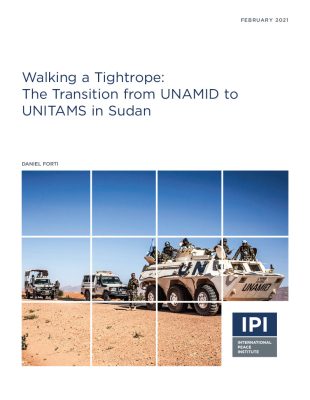The UN’s transition in Sudan started out in 2014 as a process to close the African Union–United Nations Hybrid Operation in Darfur (UNAMID) in the face of waning international support and overwhelming pressure from an autocratic regime. But in 2019, Sudan’s revolution and ongoing political transition radically transformed how the UN engages with Sudan. UNAMID’s closure in December 2020 and the start-up of a new special political mission, the UN Integrated Transition Assistance Mission in Sudan (UNITAMS), now constitute one of the most complex reconfigura- tions the organization has ever attempted.
Sudan’s revolution shifted the boundaries of discus- sions on the UN transition, both in the Security Council and within Sudan. Council members achieved consensus on the broad political objective of providing international support to the country, but clear differences emerged over how to translate this objective into a concrete strategy. Sudanese constituencies also held starkly different views on how the UN should support the country, which were brought into sharp relief by the UN’s efforts to ensure national ownership. Balancing among these different viewpoints forced the UN to make difficult decisions, particularly on protecting civilians in Darfur.
Planning for UNITAMS’s start-up and UNAMID’s exit laid bare the competing visions within the UN system of how the organization should support Sudan. It also exposed the challenges of overcoming deeply entrenched bureaucratic cultures to deliver on ambitious mandates through a “whole-of-system” approach. Moreover, this phase of the transition revealed the urgent need both for financial support to help reorient from humanitarian aid toward peacebuilding and development and for increased cooperation among the UN, the transitional government, member states, and other multilateral organizations to navigate the volatile geopolitical environment.
The UN finds itself walking a tightrope as it reconfig- ures its support to Sudan during the country’s fragile political transition. UNITAMS has an ambitious mandate but insufficient resources to immediately deliver on all its priorities. Although UNAMID’s exit has been planned for years, the relatively swift termination of its peacekeeping mandate comes at a sensitive moment: a partial peace agreement and
persistent threats to vulnerable populations would normally suggest the value of continuing a UN peacekeeping mission, not hastening its exit. The reconfiguration also comes in the midst of a pandemic and at a moment when Sudan’s transi- tional government is facing increasing pressure to meet its population’s aspirations.
The UN has forged a clear but narrow path for supporting Sudan’s transition. But the risks are also palpable, and falling off this tightrope could have devastating consequences for the organization and the country. In order to sustain the UN’s reconfig- uration in Sudan while supporting Sudan’s own political transition, the UN should consider the following:
- Articulating a forward-looking political compact with Sudan to guide UN support to the political transition;
- Rapidly expanding support for urgent peacebuilding and protection priorities in Darfur;
- Continuously evaluating the UN’s operational presence and substantive impact outside of Khartoum;
- Encouraging the Sudanese government to provide regular updates on the implementation of the Juba Peace Agreement and its national protection of civilians plan;
- Providing frequent, detailed assessments of UNAMID’s drawdown and liquidation;
- Undertaking a nationwide campaign to raise awareness of UNITAMS; and
- Considering additional reforms to the UN’s peace and security pillar on mission planning processes.
In addition, to support the efforts of the UN and the Sudanese transitional government, UN member states could consider the following:
- Articulating a forward-looking political compact with Sudan to guide UN support to the political transition;
- Rapidly expanding support for urgent peacebuilding and protection priorities in Darfur;
- Continuously evaluating the UN’s operational presence and substantive impact outside of Khartoum;
- Encouraging the Sudanese government to provide regular updates on the implementation of the Juba Peace Agreement and its national protection of civilians plan;
- Providing frequent, detailed assessments of UNAMID’s drawdown and liquidation;
- Undertaking a nationwide campaign to raise awareness of UNITAMS; and
- Considering additional reforms to the UN’s peace and security pillar on mission planning processes.
- In addition, to support the efforts of the UN and the Sudanese transitional government, UN member states could consider the following:
- Increasing financial support to coherently address Sudan’s peacebuilding and develop- ment needs;
- Maintaining a close relationship between the UN Security Council and the AU Peace and Security Council on Sudan; and
- Sustaining international attention on Sudan’s transition and maintaining UN support.
